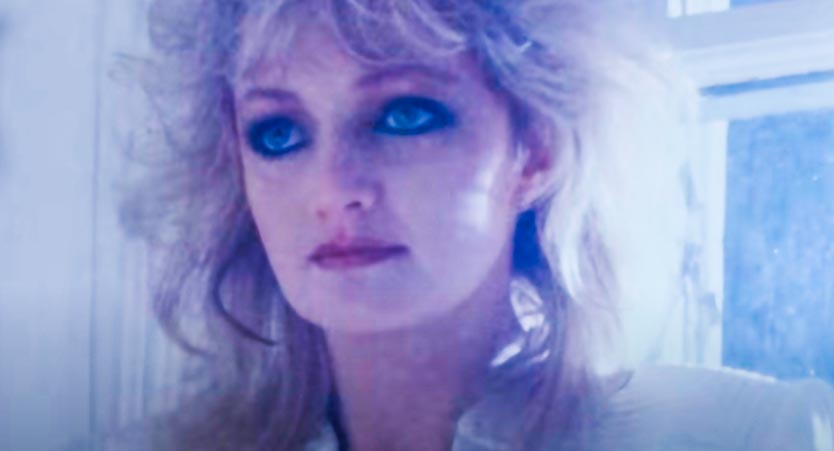Total Eclipse of the Heart:
Bonnie Tyler’s Darkest Heartache Defined
Long before it became an ’80s staple, “Total Eclipse of the Heart” was born in the mind of Jim Steinman as a vampire love song titled “Vampires in Love,” meant for his unproduced Nosferatu musical. When Bonnie Tyler knocked on Steinman’s door in New York in April 1982, she found herself presented with this dramatic duet—complete with Rory Dodd’s echoing “Turn around…” refrain. The track was recorded at New York’s Power Station later that year and released on 11 February 1983 (June in the U.S.) as the lead single from Faster Than the Speed of Night. Recognizing that seven minutes of gothic passion might not fit radio playlists, Tyler and Steinman trimmed it to a sleek four-and-a-half-minute storm of heartbreak.
Heartbreak in Full Technicolor
From its very first note—a haunting piano motif that feels like footsteps down a moonlit hall—the song plunges into emotional darkness. Tyler’s raspy delivery brings to life lyrics soaked in longing: “Once upon a time I was falling in love, but now I’m only falling apart.” The eclipse metaphor itself—“There’s nothing I can do, a total eclipse of the heart”—captures love’s power to both illuminate and obliterate, turning day into night in an instant. It’s a drama in miniature, every verse building toward the cathartic release of those soaring choruses.
Wall of Sound Meets Wagnerian Rock
Steinman, ever the sonic maximalist, applied Phil Spector–inspired “Wall of Sound” techniques to a rock ballad, layering thunderous drums, broad orchestration, and choral backing vocals behind Tyler’s powerhouse voice. He personally assembled the session band and guided every crescendo, aiming to create a true showpiece for Tyler—whose throaty tone he likened to John Fogerty’s raw edge. The result is part classical passion play, part arena-ready rock anthem, with dynamics that shift from near-whispered intimacy to full-blown orchestral eruption in seconds.
Gothic Dreams: Mulcahy’s Haunted Video
Russell Mulcahy’s video turned the Holloway Sanatorium in Surrey, England—a sprawling, disused Victorian mental hospital—into a gothic stage for Tyler’s wanderings. Clad in white among cloistered schoolboys, she drifts past candlelit corridors, spectral dancers, and floating doves, every frame drenched in chiaroscuro. It’s a perfect visual mirror for the song’s themes of isolation and desire, sealed the single’s mystique long after MTV’s heyday.
Chart Domination and Lasting Impact
Upon release, “Total Eclipse of the Heart” became Tyler’s crowning achievement. It spent four weeks at No. 1 on the Billboard Hot 100—stalling another Steinman hit, Air Supply’s “Making Love Out of Nothing at All”—and claimed the top spot in the UK, Canada, Australia, New Zealand, South Africa, and beyond. In the UK, it finished 1983 in top 3 best-selling singles, and Billboard ranked it the sixth biggest song of the year. A Grammy nomination for Best Female Pop Vocal Performance followed, and RIAA certified it gold (later platinum), with worldwide sales of six million copies. In 2015, British voters even named it the third-favorite ’80s No. 1 in an ITV poll, proof that its emotional pull hasn’t faded.
Eclipse-Fueled Resurgences
Decades on, the song enjoys predictable boosts whenever the moon aligns with the sun. During the August 2017 total solar eclipse, downloads surged by 500%, and Spotify streams jumped 214% on eclipse day —an astronomical testament to its enduring relevance. In April 2024, as North America witnessed another annular eclipse, Tyler’s anthem shot to No. 1 on iTunes and saw another streaming interest climb.
Enduring Legacy of an ’80s Anthem
Beyond chart records, “Total Eclipse of the Heart” has inspired covers from pop groups like Westlife to MTV’s Glee cast, and it resurfaced on Broadway when Steinman revived the elements of the track for his Dance of the Vampires musical in 2002. Its blend of grandiosity and raw vulnerability continues to resonate—an immortal spectacle of heartbreak cloaked in theatrical splendor, ever ready to plunge our emotions into darkness and light.

